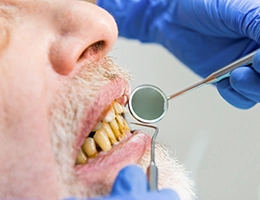8 am to 5 pm (Mon/Wed)
8 am to 4 pm (Tues/Thurs)
Phone: (979) 836-4808
Periodontal Services
What Are Periodontal Services?
The term "periodontal services" refers to a specific area of dentistry that focuses on preventing, detecting, and treating diseases that affect the gums and tooth-supporting tissues. The disease is called Periodontal Disease and is very common in the united states and is linked to many systemic health problems.
How it works?
Periodontal services involve a comprehensive approach to gum care, which includes the following steps:
Initial Evaluation: During your initial visit, our skilled dental team will thoroughly examine your gums and overall oral health. This may include measuring the depth of the gum pockets, assessing gum inflammation, and evaluating the bone density supporting your teeth. X-rays or other diagnostic procedures could also be used to obtain comprehensive information on the state of your oral health.
Diagnosis and Treatment Planning: Based on the evaluation results, the dentist will diagnose any existing gum conditions and discuss treatment options with you. The treatment plan will be customized to address your specific needs, aiming to restore and maintain healthy gums.
Non-Surgical Treatments: Mild to moderate gum disease is often treated through non-surgical procedures. These treatments typically include scaling and root planing, which includes the removal of plaque and tartar from above and below the gum line, and smoothing the tooth roots to prevent bacterial accumulation. Additionally, antimicrobial rinses or antibiotics may be prescribed to control bacterial growth and promote healing.
Surgical Treatments: In more advanced cases of gum disease, surgical interventions may be necessary. Periodontal surgeries aim to reduce pocket depths, regenerate lost bone and gum tissue, and restore the health and stability of the gums. Surgical procedures may include gum grafting, flap surgery, bone grafting, or guided tissue regeneration, depending on the patient's specific needs.
Maintenance and Follow-up Care: Following periodontal treatments, regular maintenance visits are crucial to ensure long-term gum health. These visits involve professional cleanings, monitoring of gum tissue, and reinforcement of oral hygiene practices. The number of maintenance visits will depend on the seriousness of gum disease and the demands of each patient.
Benefits Of Periodontal Services
Periodontal services offer numerous benefits for patients, including:
Prevention and Control of Gum Disease: Periodontal services play a critical role in preventing gum disease by addressing early signs of inflammation and infection.
Restoration of Gum Health: Periodontal treatments can restore the health and function of diseased gums. By eliminating bacterial infection, reducing inflammation, and promoting tissue regeneration, these services help to achieve optimal gum health and prevent tooth loss.
Preservation of Natural Teeth: Effective periodontal care can help save natural teeth that may be at risk due to gum disease. Patients can preserve their natural dentition by addressing gum-related issues and avoiding needing extractions or more invasive dental procedures.
Improved Overall Dental Health: Periodontal health is closely linked to overall dental health. Patients who maintain healthy gums minimize their chance of developing oral health issues such as tooth decay, tooth loss, and systemic health problems connected with gum disease.
Enhanced Aesthetics: Healthy gums play a vital role in the smile's overall appearance. Periodontal services can address issues such as gum recession, uneven gum lines, and excessive gum display, improving the aesthetics of the smile and enhancing patient confidence.
Long-Term Cost Savings: Periodontal treatments might help you save money in the long run. By preventing and treating gum disease early on, patients can avoid the need for more extensive and expensive dental procedures in the future.



